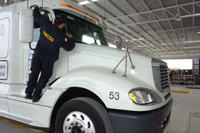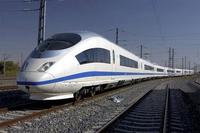-
Man smuggles 600 snakes, reptiles on bus
Acting on tip-off, police in Argentina searched the luggage of a bus passenger traveling from Santiago del Estero to Buenos Aires; the luggage contained 444 boas, vipers, and other snakes; 186 endangered tortoises; 40 lizards, and an armadillo
-
-
Shortage of funds hampers Russia's rail security
Railroads in Russia are proving to be a far greater security challenge than airports; there are 18,000 train stations in Russia; the railroad operators have money to place passenger and luggage inspection facilities, radio jamming devices, and explosion-proof containers in 34 of these stations; train stations are not the only points where railroads are vulnerable to terrorist attack; a bomb can easily be planted anywhere along a train’s route; in 2010 alone, 542 instances of “objects placed on rails” were reported, as well as 101 cases of rail sabotage; some suggested fencing off the entire length of Russia’s railroad tracks — but since railroads in Russia stretch for over 82,000 kilometers, it was calculated that the funding needed for this comprehensive measure would be 13 trillion rubles; for comparison, the entire 2011 budget of the Russian Federation stands at 8.8 trillion rubles
-
-
Detecting critical flaws in railroad lines
Rails are the only thing keeping trains weighing thousands of tons travelling anywhere from 70 to 160 miles per hour grounded, thus any flaws or imperfections in these rails could result in accidents or major delays; railroads transport more than 25 percent of the goods in the United States including critical resources like coal, lumber, chemicals, and grain; one firm has developed the technology to detect flaws in rails that could cause major disruptions or delays; most flaws occur inside the rail and cannot be seen with the naked eye
-
-
Monitoring Mexican trucks operating in the U.S.

The U.S. plan to equip Mexican trucks with electronic recorders for driver logs would be a limited, temporary program undertaken because it is the only way the Federal Motor Carrier Safety Administration (FCMSA) can ensure that the Mexican trucks will be monitored, the U.S. government says; under (NAFTA), the United States cannot require Mexican carriers to do anything that U.S. carriers are not required to do, but the government still must provide a way to monitor Mexican carriers for compliance with both the hours of service rules and the cabotage rules that restrict freight hauling between points in the United States
-
-
OSI Systems to develop advanced cargo screening system
Rapiscan Systems, the security division of OSI Systems, Inc., was recently awarded a $29 million contract with DHS’ Science and Technology Directorate to develop sophisticated new cargo screening systems; the program is designed to produce the next generation of non-intrusive cargo screening systems that will be capable of automatically detecting and identifying multiple threats and contraband including explosives, narcotics, and chemical weapons in cargo containers entering the United States by air, land, and sea.
-
-
Lawmakers want cars equipped with alcohol detection devices
A bill sponsored by nine U.S. senators would provide $60 million over five years to speed up research into devices to detect alcohol on a driver’s breath, through touch on the steering wheel or through other methods; car owners could select the option when buying a new vehicle; the device would prevent the car from starting if the driver is impaired
-
-
Britain struggles to contain rampant copper thefts
Britain is struggling to stop thieves that are stealing large quantities of copper from rail yards; the cost of these thefts to the British government has doubled to roughly $1.25 billion a year; the price of copper has hit all-time highs at just over $10,000 per ton, which has driven organized gangs to conduct dangerous raids on rail way stations; the gangs climb on to the tracks and use power tools to cut down all the copper cables they can including train signaling, electricity, and data cables; thefts are expected to increase as the demand from China is projected to push copper prices even higher
-
-
DHS interested in systems for covert body scans
DHS has signed contracts for the development of mobile and static systems that can be used scan pedestrians and people at rail and bus stations and special event venues — apparently at times without their knowledge; DHS moved to develop the technology as part of an effort to bolster the ability of law enforcement personnel to quickly detect concealed bombs and other explosives on individuals
-
-
Maryland wants Florida's high speed rail funds

As Republican governors in Florida, Wisconsin, and Ohio reject federal funding for high speed rail projects, states like Maryland are clamoring to receive those funds; Maryland Senators Benjamin L. Cardin and Barbara A. Mikulski sent a letter to Transportation Secretary Ray LaHood requesting that $2.4 billion dollars in high speed rail funding originally designated for Florida be redirected to projects in the Northeast Corridor; each year 250 million rail passengers use the corridor and passenger use is projected to increase by 60 percent by 2030; the White House plans to spend $53 billion on high speed rail projects over the next six years and $8 billion in the coming fiscal year alone
-
-
Border bottlenecks hamper trade
Last year, U.S. exports to Mexico totaled $163 billion, and imports from Mexico totaled $229.6 billion; nearly 80 percent of that trade crosses through land border ports on trucks and railcars; the 1.8-million strong Border Trade Alliance says bottlenecks at border crossings hamper this trade and make it more costly to grow it; the Alliance urges Congress and the Obama administration to invest in border ports of entry, including hiring more staff; Obama’s proposed 2011 budget includes only 300 new Customs and Border Protection officers, while Republicans propose shrinking the Border Patrol by 870 agents
-
-
Studying wait times at modified truck fast lane
Western Washington University has received $49,000 to conduct field research on wait times and lane reconfiguration at the U.S.-Canada border; the university’s Border Policy and Research Institute will collect and analyze data on wait times as part of a pilot to examine alternative use of the dedicated Free and Secure Trade truck lane at the Blaine crossing
-
-
High-speed derailment

Sophisticated high-speed commercial trains such as France’s TGV, Japan’s Bullet trains, and China’s Shanghai Maglev that travel up to 311 mph are leaving the United States in the dust; this week, President Obama proposed a 127 percent increase on public transit spending to create jobs and stimulate the economy despite Republican plans to reduce the $1.5 trillion deficit; Republican lawmakers, governors say the development of high-speed rail should left for the private market
-
-
Russia spending $1.6 billion to bolster transportation security
The Russian government announced that it would spend about $1.6 billion over the next three years to beef up transportation security; roughly $410 million will be spent on increasing metro security; Transportation Minister Igor Levitin says the metro is the weakest link in security efforts; there are 300 entrances in the Moscow metro alone; last year two female suicide bombers detonated bombs in Moscow’s busy metro system killing forty people and injuring more than 100; Moscow has the second busiest subway system in the world, second only to Tokyo
-
-
Dramatic expansion of DC surveillance camera network
Washington, D.C. is proposing a plan that would add thousands of surveillance camera feeds from local businesses to the city’s homeland security agency existing command center; the city already monitors more than 4,500 cameras placed in its public transportation system and schools; critics say that this is a poor use of resources and violates civil liberties; cities like New York, London, and Baltimore already employ this practice
-
-
United States susceptible to Moscow-style bombing
The TSA has invested $212 million to train hundreds of Behavioral Detection Officers (BDOs) in the Screening of Passengers by Observation Techniques (SPOT) program; the program is supposed to train security personnel to notice suspicious behavior by people in crowds, but lawmakers and academics question its value
-
- All
- Regional
- Water
- Biometrics
- Borders/Immig
- Business
- Cybersecurity
- Detection
- Disasters
- Government
- Infrastructure
- International
- Public health
- Public Safety
- Communication interoperabillity
- Emergency services
- Emergency medical services
- Fire
- First response
- IEDs
- Law Enforcement
- Law Enforcement Technology
- Military technology
- Nonlethal weapons
- Nuclear weapons
- Personal protection equipment
- Police
- Notification /alert systems
- Situational awareness
- Weapons systems
- Sci-Tech
- Sector Reports
- Surveillance
- Transportation
Advertising & Marketing: advertise@newswirepubs.com
Editorial: editor@newswirepubs.com
General: info@newswirepubs.com
2010-2011 © News Wire Publications, LLC News Wire Publications, LLC
220 Old Country Road | Suite 200 | Mineola | New York | 11501
Permissions and Policies
Editorial: editor@newswirepubs.com
General: info@newswirepubs.com
2010-2011 © News Wire Publications, LLC News Wire Publications, LLC
220 Old Country Road | Suite 200 | Mineola | New York | 11501
Permissions and Policies
